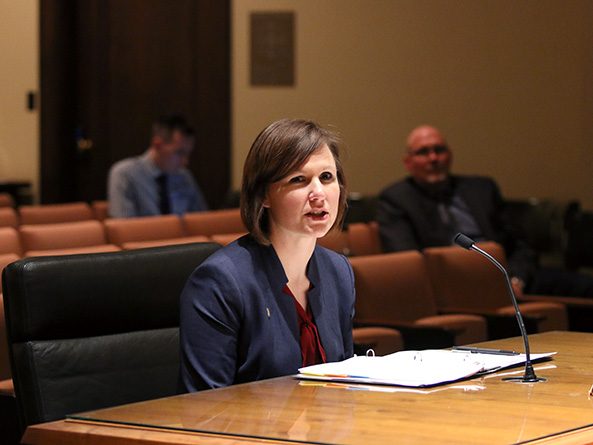Higher wage requirements for tax incentives proposed
The Revenue Committee heard testimony Feb. 1 on a bill that would increase the minimum qualifying wage level for certain tax credits and job training grants.

Businesses may receive tax credits for new employees under the Nebraska Advantage Act and the Nebraska Advantage Rural Development Act.
LB918, introduced by Lincoln Sen. Kate Bolz, would increase the minimum qualifying wage from 60 percent to 150 percent of the Nebraska average weekly wage for tier 1, 2, 3 and 4 projects under the Nebraska Advantage Act. Employees in those tiers, as well as those in tier 6, also would be required to receive employer-provided health care benefits.
Bolz said the state should set a high bar for wage requirements in its tax incentive programs so that businesses create high-skill, high-wage jobs, especially since it is spending a significant amount on those programs. The cumulative tax credit balance under the Nebraska Advantage Act is expected to reach $1.46 billion by 2021, she said.
“With an unemployment rate of 2.7 percent, we’re not in need of more jobs—we’re in need of better jobs,” Bolz said.
Employers also may receive wage credits under the Nebraska Advantage Act. For tier 1, 2, 3 and 4 projects, LB918 would increase the wage level to:
- 150 percent of the average annual wage to receive a 3 percent credit,
- 165 percent for a 4 percent credit,
- 190 percent for a 5 percent credit and
- 215 percent for a 6 percent credit.
Employers currently must pay new employees $8.25 per hour to receive tax credits under the Nebraska Advantage Rural Development Act. LB918 would increase that to 150 percent of the average weekly wage and require that employers provide health care benefits.
The bill also would require that employers pay at least 150 percent of the average weekly wage and provide health benefits to receive job training grants from the state Department of Economic Development.
The state Department of Revenue estimates that the bill would reduce tax credit expenditures by approximately $5.8 million in fiscal year 2019-20 and a further $18.9 million in FY2020-21. That would increase to $106 million by FY2025-26.
Renee Fry, executive director of the OpenSky Policy Institute, testified in support of the bill. She said a job created under the Nebraska Advantage Act would have to pay an employee $43,500 a year just to disqualify a family of three from the majority of programs that benefit low-income families. Despite that low wage threshold, a 2016 Legislative Performance Audit Committee report found that it cost between $24,500 and $320,000 in incentives to create a single job under the program.
“If we plan on incentivizing businesses,” Fry said, “we should at least ensure that jobs being created are good-paying jobs with benefits, especially given that we are at structural unemployment.”
Molly McCleery, deputy director of the health care program at Nebraska Appleseed, also testified in support of the bill. She said Nebraska’s unemployment rate was the fifth lowest in the nation last year, but it ranks in the bottom 10 states in terms of average annual wage. The state currently is providing tax incentives to companies that create jobs paying an annual wage that is low enough to qualify certain families for the Supplemental Nutrition Assistance Program and the Children’s Health Insurance Program, McCleery added.
“At the current level of incentives, we are allowing for jobs to be incentivized where those jobs are essentially being subsidized by public assistance,” she said.
Sean Johnson, senior director of business development at the Omaha Chamber of Commerce, testified in opposition to the bill. He agreed that qualifying wage levels under the Nebraska Advantage Act should be increased. However, the 150 percent threshold may be too high, especially outside the Omaha area, Johnson said.
Rather than making changes to the wage requirements, he added, the Omaha and Lincoln chambers would prefer a complete overhaul of the Nebraska Advantage Act.
“We are committed to updating the act to better target our resources in order to have a maximum effect on growing and recruiting businesses,” Johnson said. “We ask the committee to please consider those changes in a comprehensive manner rather than making small changes around the edges.”
The committee took no immediate action on the bill.


